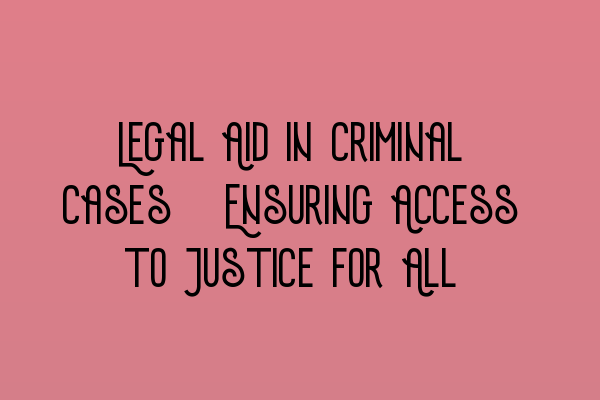Legal Aid in Criminal Cases: Ensuring Access to Justice for All
In a society that values justice and fairness, it is essential that everyone has access to legal representation, regardless of their financial situation. This is where legal aid plays a crucial role in ensuring equal access to justice for all individuals involved in criminal cases.
Understanding Legal Aid
Legal aid, as defined by the Legal Aid, Sentencing and Punishment of Offenders Act 2012, is the provision of free legal advice, assistance, and representation to individuals who cannot afford to pay for it themselves. The aim of legal aid is to ensure that no one is denied representation in criminal cases due to their financial circumstances. It is a fundamental right that promotes fairness and equality in the justice system.
However, obtaining legal aid is not always straightforward. There are eligibility criteria that must be met, and the availability of legal aid is subject to budget constraints. This means that not everyone who needs legal aid will be able to access it, creating a justice gap for those who cannot afford legal representation.
The Importance of Legal Aid in Criminal Cases
In criminal cases, where individuals face serious consequences such as imprisonment or large fines, legal aid becomes even more crucial. Without legal representation, individuals may struggle to understand complex legal processes, navigate the courtroom, and present a strong defense. This can lead to unfair outcomes and a lack of trust in the justice system.
Legal aid provides individuals with access to qualified solicitors who are trained to handle criminal cases. These solicitors have the knowledge and experience to build a robust defense, gather evidence, cross-examine witnesses, and ensure that their clients’ rights are protected throughout the legal process.
Furthermore, legal aid enables individuals to exercise their right to a fair trial. The right to a fair trial is enshrined in the European Convention on Human Rights and is a fundamental aspect of any democratic society. Without legal aid, individuals may be denied this right, as they may not have the resources to effectively present their case and challenge the evidence brought against them.
Challenges to Legal Aid
Despite its importance, legal aid has faced significant challenges in recent years. Budget cuts and reforms have resulted in a reduction in the availability of legal aid and a narrowing of the scope of cases covered. This has led to concerns about the erosion of access to justice.
Additionally, the complexity of the legal system and the increasing volume of cases have put immense pressure on legal aid providers. This can result in delays in obtaining legal representation, which can have serious implications for individuals awaiting trial.
Furthermore, the eligibility criteria for legal aid can be restrictive, leaving some individuals who are in genuine need without access to representation. This can disproportionately affect vulnerable individuals who are already marginalized and disadvantaged.
Improving Access to Legal Aid
Ensuring access to justice for all individuals is a responsibility that falls on the shoulders of the legal profession, policymakers, and society as a whole. Here are some steps that can be taken to improve access to legal aid in criminal cases:
- Increased Funding: Adequate funding is essential to ensure the availability of legal aid to those who need it. This requires a commitment from the government and policymakers to prioritize access to justice and allocate sufficient resources.
- Expanded Eligibility: The eligibility criteria for legal aid should be reviewed and revised to ensure that it encompasses a wider range of individuals who are in genuine need. This includes individuals from low-income backgrounds, victims of domestic violence, and those with mental health issues.
- Streamlined Processes: Simplifying the application process for legal aid can help individuals access representation more efficiently. This could involve utilizing technology and online platforms to streamline the process and reduce administrative burdens.
- Public Awareness and Education: Increasing public awareness about legal aid and its importance in criminal cases can help individuals understand their rights and access the support they need. This can be achieved through educational campaigns, community outreach programs, and partnerships with legal organizations.
- Collaboration within the Legal Profession: Legal professionals, including solicitors, barristers, and law firms, can collaborate to provide pro bono services or discounted rates to individuals who cannot afford legal representation. This can help bridge the justice gap and ensure that no one is left without adequate defense.
In conclusion, legal aid in criminal cases is crucial for ensuring access to justice for all individuals, regardless of their financial circumstances. It is a fundamental right that promotes fairness, equality, and the right to a fair trial. While there are challenges to overcome, with increased funding, expanded eligibility, streamlined processes, public education, and collaboration within the legal profession, progress can be made towards closing the justice gap and ensuring that no one is left without essential legal representation.
Related Articles:
- Legal Representation for Delaware LLCs in the UK: Expert Advice
- SQE Exam Prep: Essential Study Materials for Aspiring Solicitors
- Expert Testimonies in UK Courts: Building Strong Cases
- Demystifying the Solicitors Qualifying Examination Format
- SQE Exam for International Lawyers: Challenges and Success Strategies
